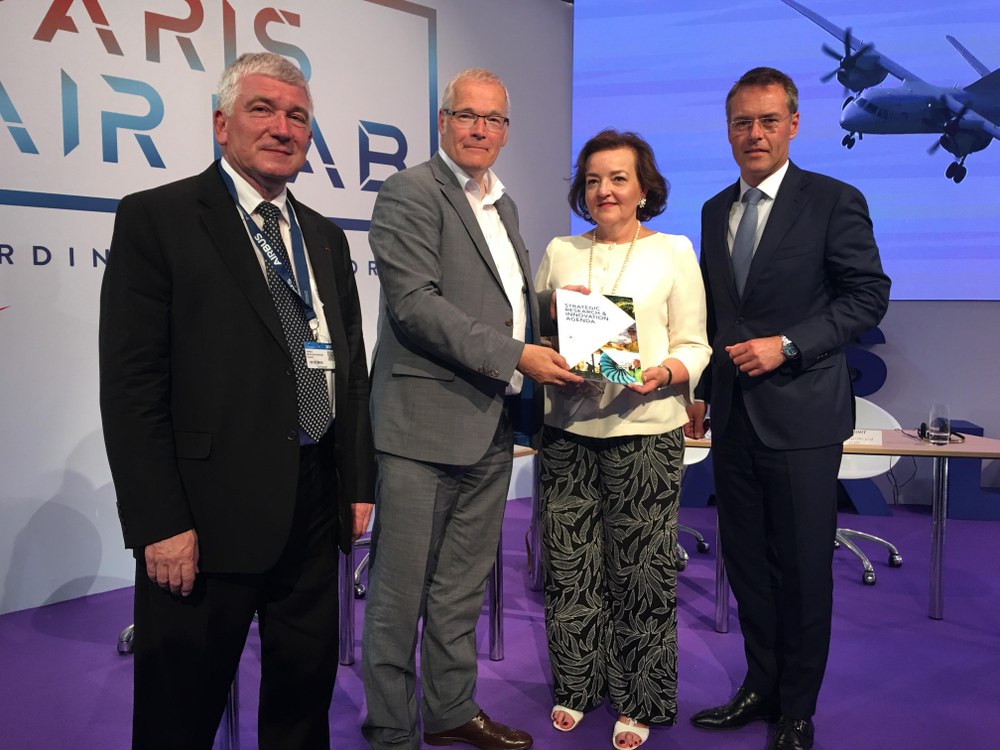Towards aircraft of the future

- Latest Strategic Research and Innovation Agenda lays out ways to conduct research into future low-emission and quieter aircraft
- Reduction of noise and carbon dioxide emissions related to aviation by 65 percent and 75 percent respectively
- Focus: Aeronautics, Digitalisation
The Advisory Council for Aviation Research and Innovation in Europe ACARE disclosed its latest Strategic Research and Innovation Agenda (SRIA) at the Paris Airshow on 21 June 2017. Rolf Henke, ACARE Chairman and DLR Executive Board member responsible for aeronautics research, presented the new research agenda to Clara de la Torre, Director for Transport at the Directorate-General for Research & Innovation at the European Commission. The updated guidelines will be followed until 2050 to carry out research into the eco-efficient aviation of tomorrow. The agenda lays out ways to conduct research into future low-emission and quieter aircraft, in order to bring aviation into line with climate change challenges. In addition, current developments such as digitalisation and cybersecurity, towards which the German Aerospace Center (Deutsches Zentrum für Luft-und Raumfahrt; DLR) will make significant contributions, are addressed in the extended agenda.
"International aviation is the driving force behind globalisation and, at the same time, sets a benchmark for other sectors, including for new materials, production technologies and safety standards," emphasised Henke during the presentation. "Intensive pan-European research activities have brought forth leading technologies worldwide in response to increasingly demanding environmental requirements for air transport. It is now necessary to strengthen the future viability and competitiveness of European aviation along the newly published SRIA research agenda, with a targeted implementation in European and national research programmes."
Aviation has changed since 2012, the year in which the first European Strategic Research and Innovation Agenda for aviation was published. The fields of action have therefore been expanded in the new edition of the SRIA, among other things, to developments in digitalisation and big data, new mobility concepts including unmanned flight, and increased challenges in terms of the competitiveness of the European aviation industry. New safety issues concerning research, challenges in cybersecurity, and increased concerns about the impact of emissions on human health, as well as new technologies, are now also taken into account.
Goal for 2050: 75 percent less carbon dioxide emissions
The newly updated SRIA research agenda published today paves the way to ambitious European goals in aviation, which were already identified in March 2011 by the European Commission under the title 'Flightpath 2050'. These objectives included the reduction of noise and carbon dioxide emissions related to aviation by 65 percent and 75 percent respectively, with respect to their values in the year 2000. At the same time, an increase in the performance of European air traffic is being pursued, with the aim of transporting 90 percent of all passengers from door to door in less than four hours. An air traffic management system is also planned, which will manage 25 million domestic flights a year.
ACARE has been providing guidelines for aviation research to major players in the aviation field since 2000. The updated SRIA agenda embodies a single European document that provides a long-term, strategic way forward in research and development towards sustainable, clean, quiet, comfortable and safe air traffic.
